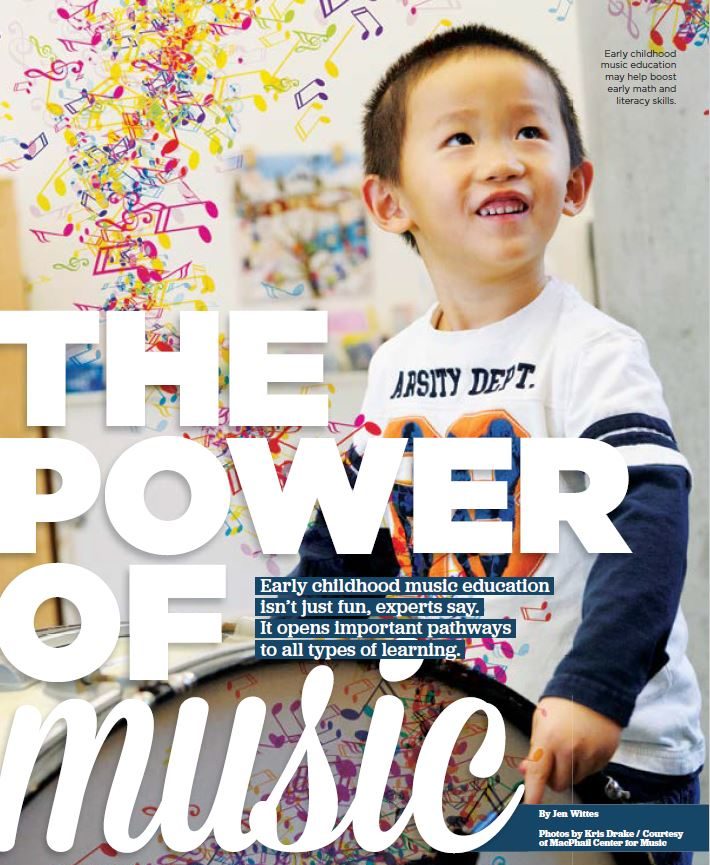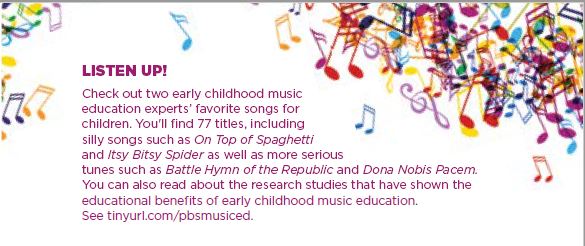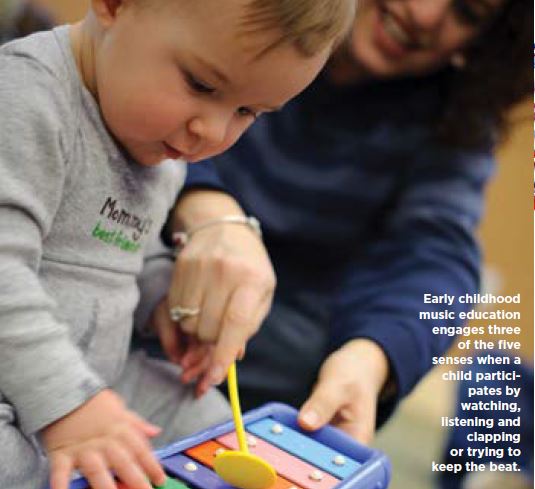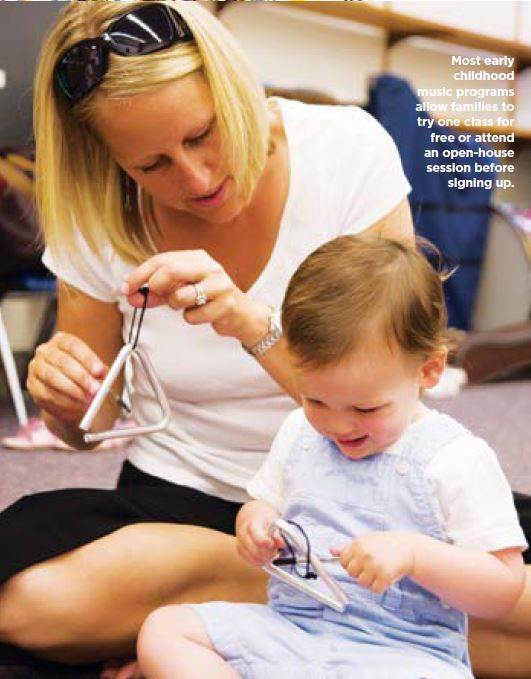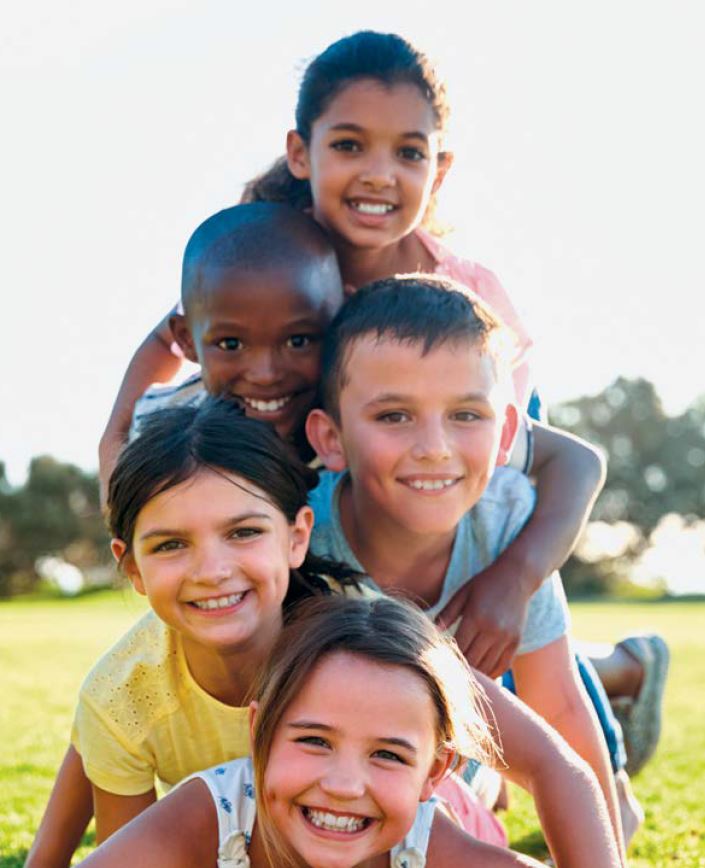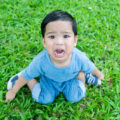Shakespeare called it “the food of love.” It can calm nerves, ignite passions and sooth a broken heart. It’s a part of nearly every celebration and ceremony. Some might call it the common language of our world.
What would your favorite movie be without it? What would life be without it?
We’re talking, of course, about music.
And it’s not just for grown-ups, of course.
During the past few years, family music programs designed for younger children — ages newborn to 5 — have become increasingly popular.
It’s no wonder. Children love music!
In fact, many babies grant us that first heart-melting, non-gassy smile when we dare to sing the ABCs or You Are My Sunshine.
Beyond play
But music isn’t just fun and games. Thanks to a growing body of research that has shown music education isn’t just a way to play with young kids, its role in early childhood education has grown.
“Exposure to musical experiences early in life can benefit overall development, build social and emotional skills, build cognitive skills, increase language capabilities, improve memory, strengthen impulse control, build school readiness, as well as set the foundation for instrument-specific learning,” said Dianna Babcock, director of early childhood music education at the nonprofit MacPhail Center for Music.
Babcock and her colleagues at MacPhail, which offers music education classes for all ages throughout the Twin Cities, are working on a three-year research project to measure the impact of early music education on the development of executive-functioning skills — also known as self-regulation skills — in young children.
So far, the findings indicate an increase in preschoolers’ pre-math and pre-literacy abilities.
What does that mean, exactly?
Launching learning
Does music actually make your child smarter?
Well, sort of.
Researchers and early childhood music education practitioners say music — which engages three of the five senses when a child participates by watching, listening and clapping — opens the child mind to far more.
“Researchers are just beginning to understand that music learning somehow turns on a switch for all learning.
“This knowledge becomes especially important when you add in the fact that 90 percent of brain development happens before age 5,” said Clarice Auluck-Wilson, director of Music Together in the Valley, which has numerous locations in the Twin Cities.
That’s why so many early childhood music teachers agree “the younger, the better.” Babies, toddlers and preschoolers are sponges for knowledge and skill. And music can be a powerful way to tap into that.
“Making music uses every part of who we are — our voice, feet, hands, memory, imagination, breath, heart, mind and soul,” said Auluck-Wilson. “What other learned life skill can make such a claim?”
Taking advantage of the many learning pathways opened by music education, Keidy Lora-Palusky offers classes that teach young children music and language at the same time.
Her Minneapolis-based program, known as Viva! Music and Movement in Spanish, offers a language immersion experience set to music.
Lora-Palusky (or “Tia Keidy,” as the kids call her) created her program two years ago and has been delighted to pass along the songs she sang as a child with her grandparents.
“More and more people are looking for ways to expose their young children to another language,” she said. “I also introduce them to musical instruments, rhythm and dancing. It has been a wonderful experience and parents and children are loving it.”
How to get started?
Parents: Your enthusiasm for music is what will — both in a classroom setting and at home — instill a love for music in your child, according to music education specialists.
You can start by breaking out the pots and pans, putting on your favorite songs, and dancing around the living room, of course.
Structured classes, often led by early childhood music specialists, however, can add a new dimension to learning music.
In the Twin Cities, parents won’t have trouble finding a wide variety of classes. In fact, there are so many — MacPhail, Music Together, Kindermusik, Musikgarten, and many more — it can be almost overwhelming.
Most programs, however, allow you to try one class for free or attend an open house before signing up. Additionally, community centers, churches, and preschools often offer similar programs, often for reduced costs.
Most early childhood music programs allow families to try one class for free or attend an open-house session before signing up.
Popular programs
Music Together is one of the most popular early childhood music programs with classes in more than 2,500 communities and more than 40 countries, including more than 50 locations in the Twin Cities.
Locally, Music Together-trained instructors offer classes under business names such as Ensemble Music, Minnemusic, Music Together West Twin Cities, Music Together in the Valley and many others.
Music Together programs offer classes “for children birth through age 7 — and the grown-ups who love them.”
Though there are some introductory classes just for younger infants, typically babies, toddlers and preschoolers are placed in mixed-age classes.
Why? Younger children enjoy watching the older children and in turn, the older children learn and build confidence by teaching the little ones.
Ages 5, 6, and 7 attend mixed-age Big Kid classes. Parents, meanwhile, can take guitar classes to further boost a family’s musicality and bring the familiar Music Together songs home to the living room.
Kindermusik and Musikgarten — two other popular national brands of music-education programming — offer similar curriculums.
Though all three of the programs are based on some pretty sophisticated neuroscience, they’re not complicated in practice: Children are intrinsically musical — and they learn basic music principles most easily in a fun and interactive program with a parent or caregiver. The caregiver component is important at this age because it helps a young child approach a group setting from a position of comfort and trust.
And because children, from birth, naturally mimic their parents, they’ll more easily make the same faces and delight in copying sounds when they’re in classes with a parent.
Of course, these programs, while similar in nature, all offer their own specific nuances and specialties. The right fit for each family comes from personal preference.
Emotional benefits
Beyond the educational piece, early exposure to music — not surprisingly — has other benefits.
“Not only do music and movement stimulate all areas of the brain simultaneously, but both — especially when done in conjunction — produce and release dopamine, a hormone and neurotransmitter that makes you feel good,” said Molly Breen, a St. Paul-based licensed Musikgarten teacher and children’s choir director.
Joining together in song can be magical, especially at a young age, and can create a sense of community, too, for children and parents alike.
Keitha Peacock, a mother of two in St. Paul, has been attending Music Together classes with her kids for more than two years.
“My daughter has become very musical. She enjoys playing with instruments and is always dancing, even when there’s no music,” Peacock said. “And she’s always singing the songs, so much so that my husband and older daughter learn her favorites without attending class.”
Peacock loves that her daughter, a toddler, is learning to interact with her peers in a formal setting similar to a preschool. Another important benefit: “When winter is long — and a toddler is full of energy — it sure is nice to have a place to go where she can move and burn off some of that energy in a safe and enjoyable manner.”
Erinn Letts of Maplewood, whose kids are age 10, 7 and 4, started taking Music Together classes when her oldest was 6 months old.
“I’m what they call a veteran,” she said. “Before being a stay-at-home mom, I was a teacher. Every class I’ve ever taken has been judged through those eyes. Music Together has several aspects that impressed me. First is the consistency. Young children thrive on consistency. Knowing what will come next makes them feel relaxed and lets them open their minds to learning and focus on the intended stimuli.”
Letts was also pleased with the wide variety of music used in class.
“It amazed me that every single collection provided my young ones opportunities to hear so much musical diversity,” she said.
Pat Gene of Minneapolis said her son, who takes music education classes at MacPhail, has always loved music.
“We’ve noticed since he could sit up that he would immediately move to the beat of music — and he still busts a move whenever he hears a fast, catchy tune,” she said. “Sometimes I can’t get him out of the car in the morning if there’s a song he likes.”
Last fall, Gene’s son was diagnosed with autism spectrum disorder.
“We feel as though music is one of his ‘calming’ agents when he gets a bit distressed,” she said.
Early childhood music education engages three of the five senses when a child participates by watching, listening and clapping or trying to keep the beat.
Future virtuoso?
If you dream of a day when your child will be able to take up an instrument more complicated than the pots and pans, then early, age-appropriate, enjoyable instruction lays the groundwork for that, too, music education specialists say.
Just as children quickly learn language — utilizing their fast-acting, sponge-like brains and without much in the way of inhibition or ego — children can often easily learn basic rhythm and even how to sing in tune.
Competence in and familiarity with the basics will not only provide a foundation for future learning, but will also allow your child to approach further musical endeavors with confidence. As your child ages out of early childhood programs, the time is ripe to reap what you have sewn. Many children successfully start an instrument as early as age 6 or 7.
Joe Alaspa, a Twin Cities-area guitar teacher and member of the Duluth-based band Cities Never Sleep said, “If the child begins early in life, the instrument becomes a part of their being. It’s always been there. As they get older, knowing the basics of their instrument frees them up to focus on advanced training at an age when the brain is extremely receptive to learning.”
Alaspa, like the early childhood music instructors, emphasizes fun in his teaching method, following the child’s interests and whims.
This can be as simple as teaching a student part of his or her favorite song, with lessons in technique along the way. Music shouldn’t be a chore, at least not when a child begins learning.
“Music is life,” Alaspa said. “It’s one of the purest forms of personal interaction I can think of.”
RESOURCES
Brighter Minds Music • brightermindsmusic.com
Joe Alaspa Guitar Lessons • [email protected]
Kindermusik • kindermusik.com
MacPhail Center for Music • macphail.org
Music Together • musictogether.com
Musikgarten • musikgarten.org



